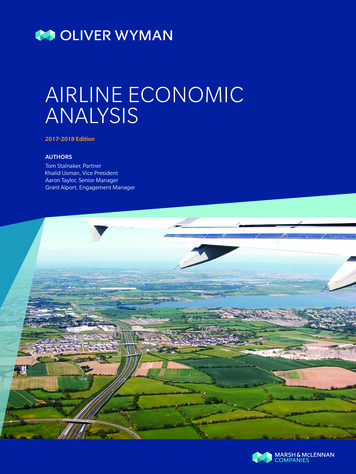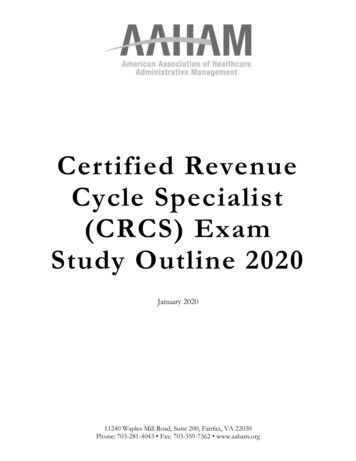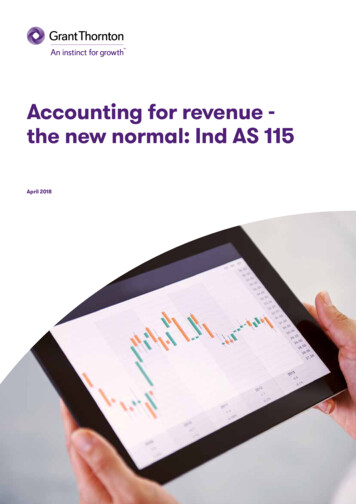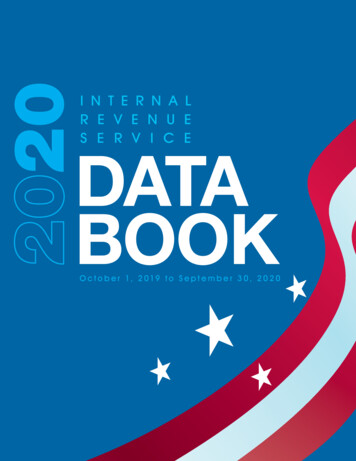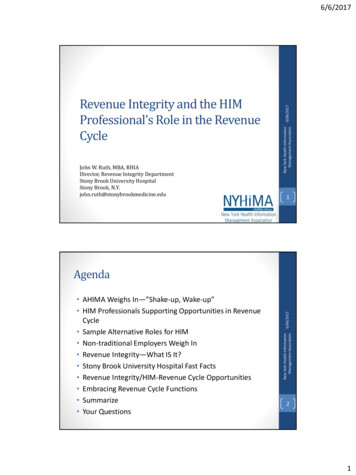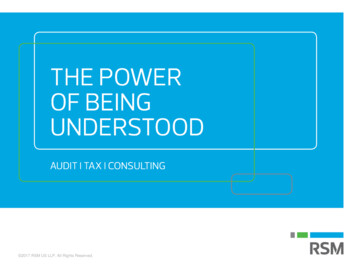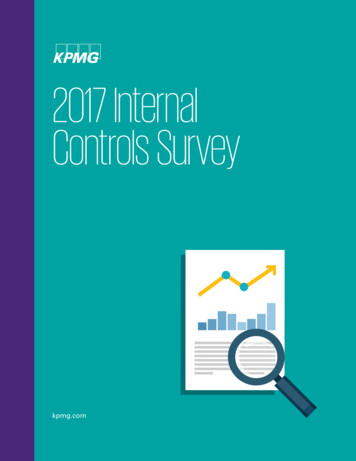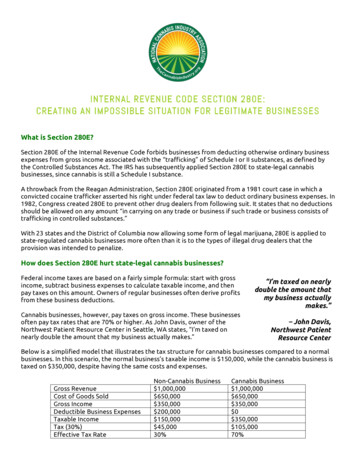
Transcription
INTERNAL REVENUE CODE SECTION 280E:CREATING AN IMPOSSIBLE SITUATION FOR LEGITIMATE BUSINESSESWhat is Section 280E?Section 280E of the Internal Revenue Code forbids businesses from deducting otherwise ordinary businessexpenses from gross income associated with the “trafficking” of Schedule I or II substances, as defined bythe Controlled Substances Act. The IRS has subsequently applied Section 280E to state-legal cannabisbusinesses, since cannabis is still a Schedule I substance.A throwback from the Reagan Administration, Section 280E originated from a 1981 court case in which aconvicted cocaine trafficker asserted his right under federal tax law to deduct ordinary business expenses. In1982, Congress created 280E to prevent other drug dealers from following suit. It states that no deductionsshould be allowed on any amount “in carrying on any trade or business if such trade or business consists oftrafficking in controlled substances.”With 23 states and the District of Columbia now allowing some form of legal marijuana, 280E is applied tostate-regulated cannabis businesses more often than it is to the types of illegal drug dealers that theprovision was intended to penalize.How does Section 280E hurt state-legal cannabis businesses?Federal income taxes are based on a fairly simple formula: start with grossincome, subtract business expenses to calculate taxable income, and thenpay taxes on this amount. Owners of regular businesses often derive profitsfrom these business deductions.Cannabis businesses, however, pay taxes on gross income. These businessesoften pay tax rates that are 70% or higher. As John Davis, owner of theNorthwest Patient Resource Center in Seattle, WA states, “I’m taxed onnearly double the amount that my business actually makes.”“I’m taxed on nearlydouble the amount thatmy business actuallymakes.”– John Davis,Northwest PatientResource Center!Below is a simplified model that illustrates the tax structure for cannabis businesses compared to a normalbusinesses. In this scenario, the normal business’s taxable income is 150,000, while the cannabis business istaxed on 350,000, despite having the same costs and expenses.Gross RevenueCost of Goods SoldGross IncomeDeductible Business ExpensesTaxable IncomeTax (30%)Effective Tax RateNon-Cannabis Business 1,000,000 650,000 350,000 200,000 150,000 45,00030%Cannabis Business 1,000,000 650,000 350,000 0 350,000 105,00070%
The taxation problem facing cannabis businesses just got worse.In January 2015, the Internal Revenue Service issued an internalmemorandum that opined on how state-legal cannabis businesses“There are a lot of businesses should compute federal income taxes. Drafted by the IRS Chiefthat are going to getCounsel, the memo rejects many of the tax deductions that thesebusinesses have traditionally made. The memo challenges taxabsolutely creamed.”strategies that allow these businesses to stay afloat, and imposes astrict interpretation of Section 280E of the Internal Revenue Code.– Jim Marty,Without even the meager deductions state-legal cannabis businessesBridge West CPAswere previously allowed to take, these businesses face a bleakfinancial future. This deeply affects their ability to reinvest profitsback into their local communities and fulfill the will of state voters, legislatures, and regulatory bodies thathave mandated that cannabis be dispensed through legal storefronts.Jim Marty, a CPA with Colorado’s Bridge West CPAs, says that many marijuana businesses are going tostruggle under the new rules. “There are a lot of businesses that are going to get absolutely creamed,” hesays.What types of business expenses are scrutinized under 280E? Employee salariesUtility costs such as electricity, internet and telephone serviceHealth insurance premiumsMarketing and advertising costsRepairs and maintenanceRental fees for facilitiesRoutine repair and maintenancePayments to contractorsState-legal cannabis businesses are allowed to deduct the Cost of Goods Sold (COGS) on their taxes. Also,since 2007, cannabis businesses have made deductions on their non-cannabis business activities. Mostimportantly, however, cannabis businesses have also followed guidance from section 263A of the IRC, whichallows businesses to capitalize on indirect costs — such as administrative and inventory costs, as well as theamount paid in state excise taxes — and deduct them under COGS.Depending on the business, these indirect costs can be sizable. The strategy of including these costs in COGSis oftentimes what allows cannabis businesses to collect meager profits.What deductions are now likely to be challenged? General and administrative costs (bookkeeping, legal expenses, technology costs)State excise taxesStorage of cannabisPurchasing cannabisDepreciation of cannabis
How did these deductions benefit cannabis businesses?Attached below are three documents that illustrate how 280E has applied to typical cannabis businessesboth before and after the tightening of IRS rules.Figure 1 is a 1065 tax filing from 2013 from a medical cannabis business in Denver, Colorado. Gross receiptstotaled 776,772, and thanks to some strong work by a CPA, the business was able to deduct 435,819 inCost of Goods Sold, leaving a gross income of 340,953. The business had an additional 153,806 indeductions that any other business would be able to take, but were disallowed under 280E. Since thebusiness was allowed deductions on Cost of Goods Sold, it paid taxes on 340,953 instead of on 776,772.Its effective tax rate was still 55% of its final earnings, but the business owner was able to invest theremaining cash back into the business.Without these deductions, what does a final tax bill look like for a state-authorized cannabisbusiness?Figure 2 is a 1065 tax filing from 2014 from a medical cannabis dispensary in Seattle, Washington. Thebusiness followed the new, even stricter 280E rules in its filing. As the documents show, gross income fromthis business totaled 154,469 for 2014, and the business had 101,100 in expenses. If this business were aregular business, it would be taxed on its earnings, which were 53,369. In order to comply with 280E,however, the business was unable to take these deductions, and instead it paid taxes on 154,469. Thebusiness’ tax payment totaled 46,340, which equates to 87% of its true earnings. The business owner hadonly 7,029 to either invest back into his business or keep as profit.What’s the worst-case scenario for a business under 280E?Figure 3 is a 1065 and Statement of Activities and Changes In Net Assets froma medical marijuana dispensary in Arizona. The business produced 876,420 ingross receipts and was permitted to deduct 319,386 in Cost of Goods Sold,but could take no deductions for its other expenses. The business, thus, wastaxed on its gross income, which was 557,034.Like many startup businesses, however, the dispensary had significant first-yearexpenses, which totaled 867,863. These operating expenses were nondeductible under 280E. So while the business actually lost a total 310,829 forthe year, its tax bill was still 189,781. Despite bringing in 876,420, thebusiness ended up more than half a million dollars in the red.Mitch Woolheiser, owner of Northern Lights Cannabis in Edgewater, Colorado,said he’s “hoarding cash” in preparation for his tax payment. “I can’t give myemployees raises. I can’t put money back into my business. Instead I’ve beenhoarding cash in anticipation of what the IRS is going to take,” Woolheiser says.“I can’t give myemployees raises. Ican’t put money backinto my business.Instead I’ve beenhoarding cash inanticipation of whatthe IRS is going totake.”– Mitch Woolheiser,Northern LightsCannabis!How many state economies are affected by 280E?Section 280E affects all businesses that engage in the cultivation, sale, or processing of the cannabis plant.This includes cultivators, medical dispensaries, marijuana retail stores, and infused product manufacturers,as well as concentrates and cannabis oil manufacturers.Cannabis is now legal in some form in 23 U.S. states as well as the District of Columbia, with Oregon andAlaska joining Colorado and Washington as states with laws regulating marijuana sales to adults over 21.Several other states are expected to enact similar laws regulating marijuana in 2016.
What impact does this have on the cannabis industry and states attempting to regulatemarijuana?“Section 280E de-incentivizespeople from filing tax returns. Itpenalizes people who are trying tobe transparent and operate withinthe law.”– Henry Wykowski,Henry G. Wykowski & AssociatesCannabis entrepreneurs want to pay federal and state taxes.Maintaining a strong working relationship with the IRSlegitimizes these businesses and, in turn, the entire cannabisindustry. But the current taxation climate has convinced somecannabis entrepreneurs to either ignore 280E on their tax filings,or forego paying taxes altogether. These businesses wouldrather gamble on the IRS overlooking their filing than see theirrevenues evaporate due to 280E.As Henry Wykowski, a California attorney who works withmarijuana clients on tax issues, states, “Section 280E de-incentivizes people from filing tax returns. Itpenalizes people who are trying to be transparent and operate within the law.”We believe the most recent IRS memo will force even more cannabis businesses to sidestep the IRS. This willundoubtedly lead to long and expensive audits, as well as lawsuits that will challenge the IRS memo and280E as a whole.How can this problem be resolved?The National Cannabis Industry Association believes that thebest fix to the situation is to remove marijuana from theControlled Substances Act. However, The Small Business TaxEquity Act – companion Senate and House legislationintroduced in the 114th Congress by Sen. Ron Wyden (D-OR)and Rep. Earl Blumenauer (D-OR) – would more narrowlyaddress the unfair impact 280E has on states with regulatedcannabis markets without necessitating a sweeping shift inU.S. marijuana policy.“The intent of the law was to go aftercriminals, not law-abiding jobcreators. Congress needs to step upand clarify that this provision hasbecome a case study in unintendedconsequences.”– Grover Norquist,Americans for Tax Reform!The legislation – S. 987 and H.R. 1855 – would exemptcannabis businesses acting in compliance with state law from the 280E provision, thereby allowing them totake the ordinary business deductions afforded to all other legal businesses.In his endorsement of The Small Business Tax Equity Act, Americans for Tax Reform President GroverNorquist said, “The intent of the law was to go after criminals, not law abiding job creators. Congress needsto step up and clarify that this provision has become a case study in unintended consequences.”!This sensible solution would bring this outdated provision of the tax code into the modern era and allowcannabis businesses to operate in accordance with the will of state voters and legislative bodies who havemandated that these businesses work within a legitimate, above-ground environment. Amending 280E willalso allow businesses in the emerging cannabis industry to better invest in their local communities by hiringadditional employees and offering more competitive salaries rather than sending inordinate amounts ofrevenue into the federal tax coffers.This document does not constitute legal or tax advice.National Cannabis Industry Association, April 2015
ACKNOWLEDGMENTSSpecial thanks to the industry experts whose contributions of time, insight, and materials made this report possible:Hilary Bricken, Harris MoureErik Briones, Minerva Canna GroupJordan Cornelius, Cornelius CPAsJohn B. Davis, Northwest Patient Resource CenterDarin Guthrie, Darin Guthrie CPAJames Hunt, James G. Hunt PLLCJim Marty, Bridge West CPAsJames Thorburn and Rich Walker, Thorburn-WalkerMatthew Walstatter, Pure Green CannabisMitch and Eva Woolheiser, Northern LightsHenry Wykowski, Henry G. Wykowski and AssociatesLuigi Zamarra, Luigi CPA
Section 280E of the Internal Revenue Code forbids businesses from deducting otherwise ordinary business expenses from gross income associated with the "trafficking" of Schedule I or II substances, as defined by the Controlled Substances Act. The IRS has subsequently applied Section 280E to state-legal cannabis
